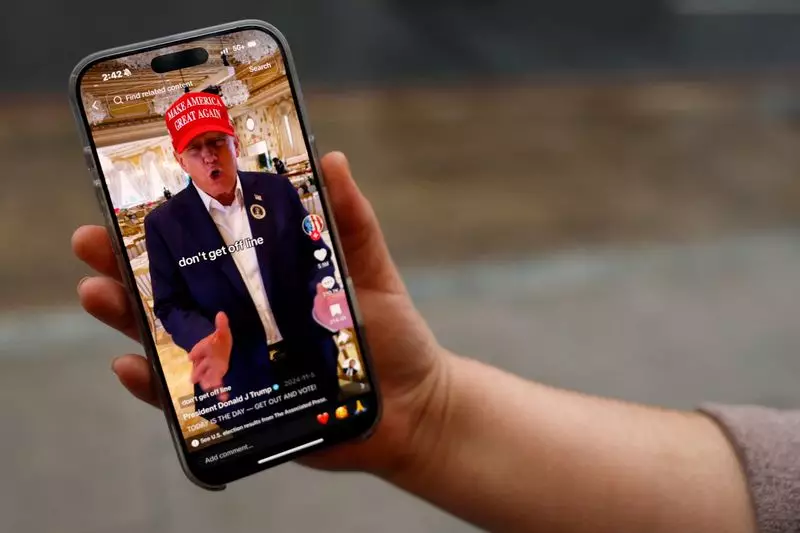In a dramatic pivot, TikTok recently announced the restoration of its services in the United States, coinciding with President-elect Donald Trump’s assertion that he would favorably reactivate the app if he returned to power. The platform’s communication to users emphasized that it was reigniting its presence in America owing to Trump’s assurances of protection for service providers. With more than 170 million Americans relying on TikTok and over 7 million small businesses benefiting from its marketplace, the stakes couldn’t be higher for both the platform and its users.
This scenario unfolds against a backdrop of heightened tensions between the United States and China, adding intricate layers to the business and political decisions concerning the app. Trump’s new approach marks a stark contrast to his actions during his presidency from 2016 to 2020 when he sought to eliminate TikTok from the American landscape citing severe national security threats associated with its Chinese parent company, ByteDance. In this renewed iteration of the TikTok saga, one can observe a blend of political strategy and corporate maneuvering that underscores the intertwined nature of technology and geopolitics.
The abrupt pause of TikTok services was in response to a legislative ban initiated late on a Saturday, dictating the terms under which the app would need to sever ties with ByteDance by Sunday. The U.S. government raised alarms about the potential misuse of American user data by the Chinese government, introducing a significant risk factor that weighs heavily on social media platforms owned by Chinese entities.
In the aftermath of the ban, TikTok’s service disruption fueled public anxiety, with diverse reactions highlighting its critical role in the lives of countless users—especially the younger demographics who heavily utilize the platform for entertainment, inspiration, and commerce. The sudden halt prompted users to explore alternative platforms, including those based in China like RedNote, while competitors such as Instagram and Snap strategically positioned themselves to absorb TikTok’s user base. The economic implications are not trivial; rising stock prices for these rivals signal a shift in investor sentiment toward potential gains from TikTok’s misfortunes.
Political Leverage and Corporate Strategies
As Trump prepares to re-enter political life, he has expressed newfound admiration for TikTok, crediting its role in connecting with younger voters during the upcoming 2024 elections. Remarkably, his latest stance appears to move away from an outright ban to a more collaborative solution that could see a joint venture involving significant U.S. investment.
By proposing a 50% ownership stake for American interests, Trump’s administration seems to be advocating a regulatory framework allowing TikTok to operate while ensuring national security is prioritized. This highlights a budding relationship between American commerce and international diplomacy where tech giants find themselves as central players in a complex geopolitical chess game.
However, the division within the Republican Party regarding Trump’s proposed “Save TikTok” initiative exhibits the challenges ahead. With certain factions firmly opposing any leniency towards the app without complete divestment from Chinese management, the path to a resolution appears fraught with obstruction and contention.
The repercussions of the TikTok debacle extend beyond immediate user concerns. Marketing firms that rely on TikTok for outreach and engagement have scrambled to devise contingency plans in response to potential losses. A critical sentiment echoed among marketing executives was encapsulated in the phrase “hair on fire,” illustrating a sense of urgency to adapt to rapidly changing circumstances.
Moreover, TikTok’s CEO Shou Zi Chew is expected to attend high-profile political events that might fortify alliances with influential figures. Amid such public relations efforts, the market is alive with potential suitors vying for opportunities as the platform faces existential threats. Notable individuals, including Elon Musk and others, have been mentioned as prospective partners in a potential restructuring or sale of TikTok’s U.S. operations.
As the story of TikTok continues to unfold, it remains a microcosm of larger issues at play in international relations, technology, and commerce. The delicate balance between protecting national security and fostering innovation amid a global economic network is precariously maintained. With the U.S. Supreme Court recently upholding a stringent law governing foreign-owned social media platforms, the stakes for TikTok remain high.
Importantly, the Chinese government’s reaction to these unfolding events will also shape future interactions. China openly protested against U.S. measures on TikTok, underscoring the broader implications of tech diplomacy. As the app attempts to reestablish itself, it not only navigates the turbulent waters of American policies but also the implications of being a significant player on the global stage, primarily dictated by political and commercial interests.
TikTok’s journey offers a rich, multifaceted case study that reflects broader themes of globalization, national security, and the untamed nature of digital interaction in a world that is intimately connected yet starkly divided.

